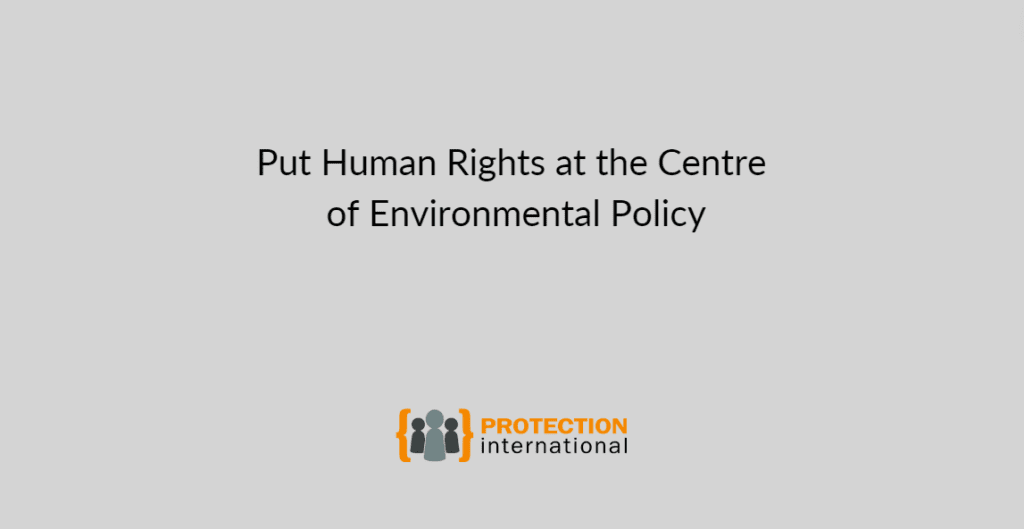More than 150 civil society and indigenous organisations, and academics, from more than 50 countries, published an open letter calling on world leaders to put human rights at the centre of environmental policy.
Respecting and protecting human rights and protecting the environment are inextricably linked. Yet while Heads of State from 88 countries have called to end siloed thinking in the Leaders Pledge for Nature, environmental policy-making still too often excludes or sidelines human rights.
Today we, the undersigned – a broad range of indigenous peoples’ organisations, and civil society groups, including human rights, environmental and conservation organisations and human rights, land and environmental defenders, as well as academics and experts from the Global South and North –call on the world’s leaders to bring together human rights, environmental and climate in policy-making to secure a just, equitable and ecologically healthy world for all.
The reciprocal relationship between nature and people has existed since time immemorial, but it is now unbalanced. There are countless examples in all parts of the world of how forests, savannas, freshwater sources, oceans, and even the air itself, are being privatised, polluted and destroyed by industries such as agriculture, timber, pulp and paper, mining and oil and gas extraction. These and many other industries not only wreak destruction on Mother Earth, but they also have direct and devastating impacts on human rights. Indigenous peoples and local communities living near the production, extraction and processing of raw materials suffer dispossession of their lands, impoverishment, deterioration of their health, and destructive impacts on their culture, among many other abuses. In turn, human rights, land and environmental defenders who seek to prevent these violations suffer threats, criminalisation violent attacks, and increasingly, killings.
The costs of both environmental destruction and measures to address this often fall disproportionately on those already in precarious positions – such as indigenous peoples, afro- descendants, local communities, women, children and youths, and poorly-paid workers, particularly in the Global South but also in the Global North – while the profits of the largest and most environmentally-damaging industries, and the wealth of their owners and financers, continues to grow. It is unforgivable that polluting industries profit at the expense of the health and human rights of marginalised communities. And, ultimately, this environmental destruction has indirect human rights impacts on us all.
Just this month the Human Rights Council adopted a resolution recognising the Right to a Healthy Environment. Yet while there is evidence that the protection of human rights can lead to better environmental outcomes, calls for recognition of the holistic and indivisible nature of human rights and the environment often go unheeded in global, regional and national environmental and climate policy forums.
This must change. As a global community, we face multiple, intersecting crises: increasing human rights abuses and environmental harms by companies, land grabs, the loss of food and water sovereignty, increasing poverty and inequality, increased attacks and killings of defenders, climate change-induced disasters and migration, the diminishing health of the oceans and critical biodiversity loss. Resolving these crises demands a holistic approach to environmental policy that embeds human rights and tackles systemic problems, including historically rooted social injustice, ecological destruction, state capture by corporations, corruption and impunity, as well as social and economic inequality.
We urge world leaders to ensure that all policymaking related to the environment – including the climate and biodiversity crises, ownership and use of land, water and resources, ecosystem degradation, corporate accountability and trade, among others – address human rights and the environment in an integrated manner. This would help to catalyse the transformative action that is urgently required.
Respect for, protection, promotion and fulfilment of human rights, and the protection of those who defend them, must be an essential and non-negotiable part of measures adopted in upcoming negotiations at the UN Convention of Biological Diversity, COP15, and the UN Framework Convention on Climate Change, COP26. Human rights must also be central to regional and national level climate and environmental policies, such as proposed deforestation legislation in the UK, the EU and the USA, which must be further strengthened. The time to act is now: we call on you to unite human rights, climate and the environment once and for all. In doing so, you can help us and our future generations to thrive by living in harmony with nature. In doing so, you can affirm that both nature and people have intrinsic worth and that governments are serious about living up to their duty both to protect Mother Earth and to respect, protect and fulfil human rights.
Read the original version in English, Arabic, Chinese and Portuguese.


